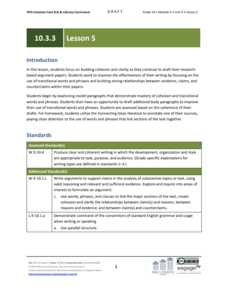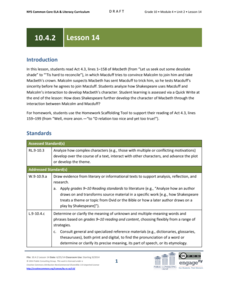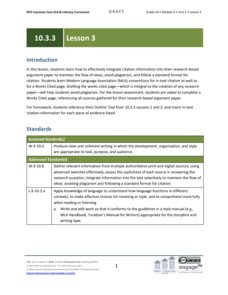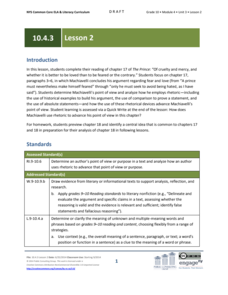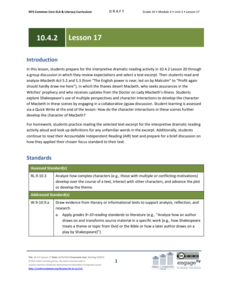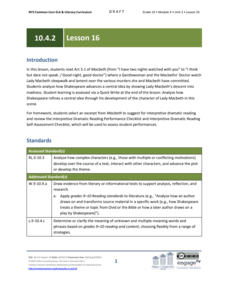EngageNY
Grade 10 ELA Module 3: Unit 3, Lesson 7
What's your style? Writers examine wording to add formal style and objective tone to their argumentative papers. After looking at examples of sentences, learners use turn and talk to discuss which sentences have a formal style before...
EngageNY
Grade 10 ELA Module 3: Unit 3, Lesson 6
And that's a wrap! Scholars create their concluding statement drafts by examining model text with exemplar conclusions. In pairs, they discuss how transitional words and phrases add to sentence structure and consider how their concluding...
EngageNY
Grade 10 ELA Module 3: Unit 3, Lesson 5
Can you please clarify? Scholars continue to work on their argumentative essays about selling human tissue by clarifying and adding cohesion. Writers begin by looking at model paragraphs and then begin improving their writing. They...
EngageNY
Grade 10 ELA Module 4: Unit 2, Lesson 14
How does Shakespeare further develop Macbeth's character using the interaction between Macduff and Malcolm? Pupils write responses to the question. They continue their analysis of Macbeth with a masterful reading and guided whole-class...
EngageNY
Grade 10 ELA Module 4: Unit 2, Lesson 13
Lady Macduff uses a metaphor to suggest that her husband does not possess the courage of even a tiny, short-winged bird—ouch! Using the resource, pupils discover Act 4.2 of Shakespeare's Macbeth. Using reading, writing, and discussion,...
EngageNY
Grade 10 ELA Module 4: Unit 2, Lesson 12
How do the Three Witches' interactions with Macbeth advance the plot of Shakespeare's Macbeth? Learners complete a Quick Write to answer the question. They also participate in a whole-class dramatic reading of Act 4.1.
EngageNY
Grade 10 ELA Module 4: Unit 2, Lesson 11
How does Shakespeare develop the idea of appearance versus reality in Macbeth? Using the resource, pupils discuss the plot in small groups. Scholars also complete a Quick Write analyzing how the interactions between Macbeth and Lady...
EngageNY
Grade 10 ELA Module 4: Unit 2, Lesson 10
Is it better to be dead than to "dwell in doubtful joy," as Lady Macbeth suggests in Act 3.2 of Shakespeare's Macbeth? Using the resource, scholars work in small groups to discuss how Lady Macbeth and Macbeth begin to unravel following...
EngageNY
Grade 10 ELA Module 4, Unit 2, Lesson 23
Withered, wild, and bearded are three adjectives that describe the Witches from Shakespeare's Macbeth. Scholars view paintings and discuss how different artists depict the witches. Pupils also complete a Quick Write to analyze Henry...
EngageNY
Grade 10 ELA Module 4, Unit 2, Lesson 25
How do film adaptations differ from their literary counterparts? Scholars watch and analyze the 2011 Royal Shakespeare Company (RSC) production of Shakespeare's Macbeth. Pupils complete a Quick Write analyzing how the RSC production...
EngageNY
Grade 10 ELA Module 4, Unit 2, Lesson 26
How do directors' choices emphasize different elements of a drama? Scholars participate in a discussion about the Royal Shakespeare Company production of Macbeth and Akira Kurosawa's Throne of Blood. Finally, they write an analysis of...
EngageNY
Grade 10 ELA Module 3: Unit 3, Lesson 3
Who said that? Scholars now learn how to cite evidence, give ideas proper credit, and work to understand the meaning of plagiarism. Part of the activity includes looking at an MLA Citation handbook, handy when pupils create their works...
EngageNY
Grade 10 ELA Module 3: Unit 3, Lesson 1
Human tissue for sale or rent? Scholars refer back to articles they read in the previous unit and make a claim as to whether they believe it's okay to sell human tissue. Learners talk with partners, complete an outline tool, and collect...
EngageNY
Grade 10 ELA Module 3: Unit 3, Lesson 2
Put yourself in my shoes! Scholars work through the Outline Tool from the previous lesson plan to develop a claim before developing a counterclaim about selling human tissue. Learners also create supporting claims using an outline tool....
EngageNY
Grade 10 ELA Module 4: Unit 3, Lesson 4
According to Machiavelli, a good ruler does whatever it takes. Using the resource, scholars work in small groups to analyze quotes from The Prince and then participate in a whole-class discussion. To finish, pupils select a phrase and...
EngageNY
Grade 10 ELA Module 4: Unit 3, Lesson 3
What's the difference between men and princes? Machiavelli discusses this distinction in chapter 18 of The Prince. Scholars first listen to a masterful reading of the chapter. Then, they write about how the author develops a central idea...
EngageNY
Grade 10 ELA Module 4: Unit 3, Lesson 2
How do rhetorical devices advance an author's point of view? Scholars consider this question as they continue exploring Machiavelli's The Prince. They work in small groups, annotating the text for evidence of rhetoric before engaging in...
EngageNY
Grade 10 ELA Module 4: Unit 3, Lesson 1
Is it better to be loved or feared? Using the resource, scholars explore Machiavelli's nonfiction text, The Prince, and examine the author's ideas about the role of leadership. Pupils also complete a Quick Write to analyze a central idea...
EngageNY
Grade 10 ELA Module 4, Unit 2, Lesson 23a
What is the best way to present information concisely and logically? Using an informative resource, scholars review the criteria for a successful presentation. They share their arguments about which character from Shakespeare's Macbeth...
EngageNY
Grade 10 ELA Module 4, Unit 2, Lesson 24
What might viewers notice about the characters, setting, and cinematic choices in the movie version of a play? Pupils view an excerpt from Throne of Blood, Akira Kurosawa's film adaptation of Shakespeare's Macbeth. To finish the...
EngageNY
Grade 10 ELA Module 4: Unit 2, Lesson 17
Madness, violence, despair—the titular character of Shakespeare's Macbeth is spiraling out of control. Pupils first explore the topic with a collaborative jigsaw discussion. At the end of the instructional activity, they write about how...
EngageNY
Grade 10 ELA Module 4: Unit 2, Lesson 18
Macbeth describes life as a light and a candle, suggesting it is fleeting and meaningless. Using the resource, scholars engage in an evidence-based discussion and complete a Quick Write about Shakespeare's use of figurative language in...
EngageNY
Grade 10 ELA Module 4: Unit 2, Lesson 15
What goes around, comes around. Using the resource, pupils read Act 4.3 of Macbeth, in which Macduff and Malcolm plan to attack Macbeth. Scholars then hold a discussion and complete writing activities to analyze Shakespeare's structural...
EngageNY
Grade 10 ELA Module 4: Unit 2, Lesson 16
How do complex characters develop throughout a text? Pupils read Act 5.1 from Shakespeare's Macbeth, which depicts Lady Macbeth's descent into madness. Using discussion and writing exercises, scholars analyze how Shakespeare develops...
Other popular searches
- Grading Rubrics
- Age Grading
- Grading Group Work
- Written Expression Grading
- Grading Chart
- Book Report Grading Rubric
- Grading of Dairy Products
- Teacher Grading Chart
- Argumentative Essay Grading
- Percentage Grading Chart
- Grading Rubrics for Poetry
- Peer Grading Rubrics




